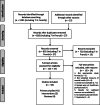Psychological impact of an epidemic/pandemic on the mental health of healthcare professionals: a rapid review
- PMID: 32787815
- PMCID: PMC7422454
- DOI: 10.1186/s12889-020-09322-z
Psychological impact of an epidemic/pandemic on the mental health of healthcare professionals: a rapid review
Abstract
Background: Epidemics or pandemics, such as the current Coronavirus Disease 2019 (COVID-19) crisis, pose unique challenges to healthcare professionals (HCPs). Caring for patients during an epidemic/pandemic may impact negatively on the mental health of HCPs. There is a lack of evidence-based advice on what would be effective in mitigating this impact.
Objectives: This rapid review synthesizes the evidence on the psychological impact of pandemics/epidemics on the mental health of HCPs, what factors predict this impact, and the evidence of prevention/intervention strategies to reduce this impact.
Method: According to rapid review guidelines, systematic searches were carried out in Embase.com , PubMed, APA PsycINFO-Ovid SP, and Web of Science (core collection). Searches were restricted to the years 2003 or later to ensure inclusion of the most recent epidemic/pandemics, such as Severe Acute Respiratory Syndrome (SARS). Papers written in French or English, published in peer-reviewed journals, and of quantitative design using validated measures of mental health outcomes were included. Of 1308 papers found, 50 were included. The full protocol for this rapid review was registered with Prospero (reg.no. CRD42020175985).
Results: Results show that exposed HCPs working with patients during an epidemic/pandemic are at heightened risk of mental health problems in the short and longer term, particularly: psychological distress, insomnia, alcohol/drug misuse, and symptoms of posttraumatic stress disorder (PTSD), depression, anxiety, burnout, anger, and higher perceived stress. These mental health problems are predicted by organizational, social, personal, and psychological factors and may interfere with the quality of patient care. Few evidence-based early interventions exist so far.
Discussion: HCPs need to be provided with psychosocial support to protect their mental wellbeing if they are to continue to provide high quality patient care. Several recommendations relevant during and after an epidemic/pandemic, such as COVID-19, and in preparation for a future outbreak, are proposed.
Keywords: COVID-19; Epidemic; Healthcare professionals; Intervention; Interventions; Mental health; Outbreak; Pandemic; Prevention; Review.
Conflict of interest statement
The authors declare that the research was conducted in the absence of any commercial or financial relationships that could be construed as a potential conflict of interest.
References
-
- Kunin M, Engelhard D, Piterman L, Thomas S. Response of general practitioners to infectious disease public health crises: an integrative systematic review of the literature. Disaster Med Public Health Prep. 2013;7(5):522–533. - PubMed
-
- Green MS, Swartz T, Mayshar E, Lev B, Leventhal A, Slater PE, Shemer J. When is an epidemic an epidemic? Isr Med Assoc J. 2002;4(1):3–6. - PubMed
-
- Morens DM, Folkers GK, Fauci AS. What is a pandemic? J Infect Dis. 2009;200(7):1018–1021. - PubMed
-
- Vyas KJ, Delaney EM, Webb-Murphy JA, Johnston SL. Psychological impact of deploying in support of the US response to Ebola: a systematic review and meta-analysis of past outbreaks. Mil Med. 2016;181(11):E1515–E1531. - PubMed
MeSH terms
LinkOut - more resources
Full Text Sources
Medical
Miscellaneous


